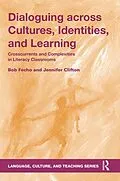Drawing on Dialogical Self Theory, this book presents a new framework for social and cultural identity construction in the literacy classroom, offering possibilities for how teachers might adjust their pedagogy to better support the range of cultural stances present in all classrooms.
Autorentext
Bob Fecho is Professor of English Education, Teachers College, Columbia University, USA.
Jennifer Clifton is Assistant Professor, Department of English (Rhetoric and Writing Studies), The University of Texas at El Paso, USA.
Inhalt
Contents
Dedication
Introduction
The Purpose of the Book
Creating a Context for Dialoguing about Cultures and Selves
Sketching the Landscape of the Book
What to Expect from This Book
References
Chapter 1: Cultures and the Dialogical Self
Sketching the Dialogue of Cultures
Constructing a Self
Dialoguing with Multiple Cultures
Dialoguing Through Uncertainty
References
Chapter 2: Learning, Cultures, and the Dialogical Self
So Where Is This Going?
Cultures, Learning and "Ideological Becoming"
Ideological Becoming within Ideological Environments
Relationships with the Self in Educational Contexts
Now, and Then
References
Chapter 3: Literacies, Learning, Cultures, and the Dialogical Self
Literacies and Dialogical Selves
Connecting Bakhtin, Literacy, and the Dialogical Self
Learning within Tensions
Implications for Teaching Reading and Writing
References
Chapter 4: Identity, Literacies, Learning, Cultures, and the Dialogical Self
Constructing Identities
Some Reminders and Some New Connections
Learning through Isaac and Sam
What We Make of All This
References
Chapter 5: Agency, Identity, Literacies, Learning, Cultures, and the Dialogical Self
Unpacking Agency
Takeaways
Last Words, at Least for Now
References
About the Authors
Index
